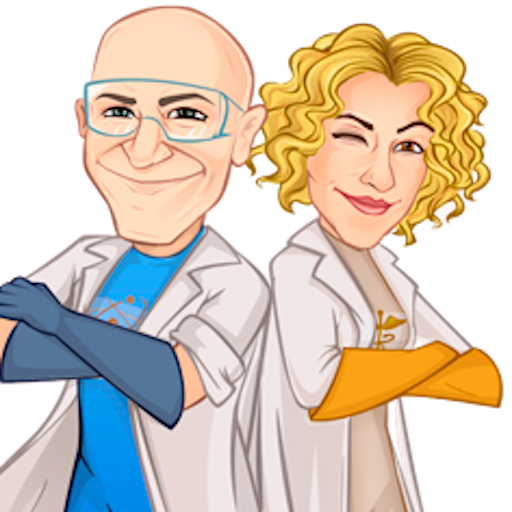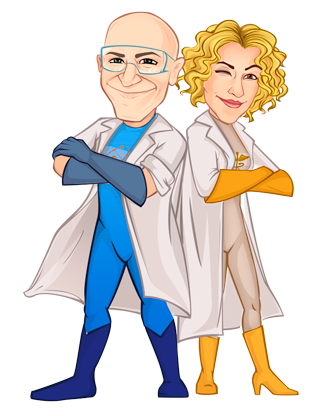Joy could smell a musky odor coming from her husband’s neck area, but she didn’t think much of it, until six years later, when he was diagnosed with Parkinson’s disease. Joy and her husband were attending a Parkinson’s disease support group, and to her astonishment, she detected the same musky smell coming from the other patients. She decided to tell her doctor, who contacted a research lab, which performed a controlled experiment with her.
The researchers selected 12 people — 6 healthy individuals and 6 people with Parkinson’s disease — and asked them to wear similar new T-shirts for one day. Then Joy was asked to guess, just from the smell of the T-shirts, which subjects had Parkinson’s disease and which were healthy.
Joy correctly identified 5 healthy individuals and 6 with Parkinson’s disease, but said that one of the healthy subjects also had the telltale musky odor, therefore putting him in the Parkinson’s disease group. The researchers concluded from Joy’s imperfect performance that it wasn’t clear if her accurate assessments of 11 of the test subjects were real, or due to a fluke of random chance.
However, to the researchers’ astonishment, eight months later that supposedly misidentified “healthy” individual was also diagnosed with Parkinson’s disease, making Joy’s nose 100 percent accurate. Not only could she diagnose Parkinson’s disease by smell alone, but she could diagnose it several months before the first symptoms appeared.
The consequence is that biomedical researchers are now trying to create an “electronic nose” that can detect volatile organic compounds coming from people with Parkinson’s disease, so that physicians can use that test to diagnose people several years before their first symptoms and treat them early in order to improve their prognosis.
Joy’s case highlights a fast-growing awareness that human smell is far more sensitive than neuroscientists and sensory psychologists had thought.
Recent experiments at the University of California, Berkeley, and at Rutgers University, demonstrate that humans can accurately track people across a lawn — just from scent — when they place their noses close to the ground, like bloodhounds.
In a Science magazine article on human olfaction published a few months ago, John McGann pointed out that our noses can detect a broad range of important scents, which were once believed to be detectable only by “lower” mammals like dogs and rats:
Odor-mediated communication between individuals, once thought to be limited to “lower animals,” is now understood to carry information about familial relationships, stress and anxiety levels, and reproductive status in humans as well, although this information is not always consciously accessible.
Neurobiologist Leslie Vosshall and colleagues at Rockefeller University now estimate that humans can detect at least 1 trillion unique odors, not the paltry 10,000 that sensory psychologists originally believed were detectable).
It should come as no surprise, then, that since 400 BC, when Hippocrates — the father of medicine — first taught students to diagnose different diseases by their distinct odors, physicians have claimed to be able to detect illnesses by smelling saliva, sweat, urine, vaginal fluid, and wounds (bacteria in infected injuries give off a range of odors, like fermentation).
More recently, a double-blind placebo-controlled crossover design done by Christina Regenbogen and her team at the Karolinska Institute demonstrated that humans can detect bacterial infections, without any wounds, in other humans, and unconsciously avoid those who are infected.
Finally, it also turns out that the absence of certain odors — or at least our ability to detect them — can also be an early diagnostic indicator of some diseases. For example, just-published research from the University of Chicago demonstrated that Alzheimer’s sufferers exhibit an inability to smell peppermint, consistent with earlier studies showing olfactory deficits in dementia patients
Joy’s story, and all of the recent research just cited, point to a compelling conclusion: We should trust our perceptions and pay close attention to what our nose is — and isn’t — telling us about what’s going on around us. The health of our friends and families could depend on it.
This idea that we should listen very closely to what our bodies are telling us is important not only for sensing disease in those around us, but also, as in the case of olfactory deficits in neurological patients, in ourselves. I call the process of diagnosing illness by focusing on sensory information from our bodies giving the body a voice.
So, here is a question for you: What can you smell?
Maybe, if you tune into what your nose can sniff, you can detect changes in the way someone you know smells — we are not talking about new soaps or new perfumes — and save a life by getting the person to a physician for early diagnosis and treatment.
**This article was originally published on Dr. Chris Gibert’s Psychology Today Column**
© Dr. Chris Gilbert


